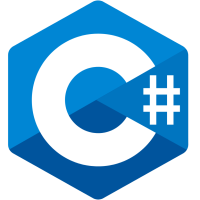
C# Integer Variable Types
An Integer data types are used to work with numbers. Perhaps the most widely used of the variable types is the integer.
C# provides a number of different integer types based on number size and whether the integers are signed (positive or negative) or unsigned (positive only). All the integer variable types have one thing in common and that is that they may only be used to store whole numbers.
In C#, the datatype is denoted by the Int32 keyword. Below is an example of how this datatype can be used. In our example, we will define an Int32 variable called numo. We will then assign an Integer value to the variable and then display it accordingly.
using System;
using System.Collections.Generic;
using System.Linq;
using System.Text;
using System.Threading.Tasks;
namespace HelloWorld
{
class Program
{
static void Main(string[] args)
{
Int32 numo = 120;
Console.WriteLine(numo);
Console.ReadLine();
}
}
}
Output:
If the above code is entered properly and the program is executed successfully, following output will be displayed:
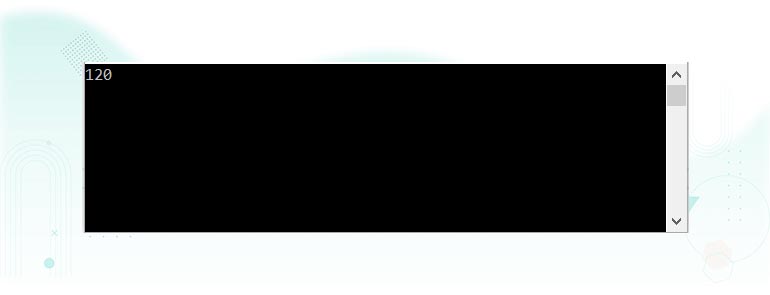
Code Explanation:
- The
Int32data type is specified to declare an Integer variable called numo. - The variable is then assigned a value of 120.
- Finally the
Console.WriteLinefunction is used to display the number to the console.
From the output, you can clearly see that the Integer variable called numo was displayed in the console.
We can specify Integer Literals in the ways:
- Decimal literals (Base 10): In the decimal type of literals
0-9digits are allowed. No prefix is required for the decimal type of literals.
int x = 200; // decimal typeThe following example shows the integer literals in decimal without any prefix:
int quantity = 20;
int amount = 30;If a number is big, you can use the digit separator (_) to make it more readable. Note that you can use the digit separator (_) for all integer literals, not just decimal. For example:
int prize = 5_000_000;
- Octal Literals (Base 8): In the octal type of literals
0-7digits are allowed.0is used as a prefix to specify the form of octal type literals.
//The octal number should be prefix with 0.
int x = 072; // octal type- Hexa-decimal literals (Base 16): In the hexadecimal type of literals, digits from
0- 9and characters froma-fare allowed. Uppercase and lowercase both types of characters are allowed in this case. As we know that c# is a case-sensitive programming language but here c# is not case-sensitive.0Xor0xis used as a prefix to specify the form of hexadecimal type of literals.
// The hexa-decimal number should be prefix
with 0X or 0x.
int x = 0X123Fact; // hexadecimal type - Binary literals (Base 2): In this form, the allowed digits are only
1’s and0’s. Binary numbers have the0bor0Bprefix.
int x = 0b101; // The binary number should be prefix with 0b.
int flag = 0b10011110;
Also, you can use the digit separator (_) to separate the digits like this:
int flag = 0b_1001_1110;
Integer Types
Integer type numbers are positive or negative whole numbers without decimal points. C# includes four data types for integer numbers: byte, short, int, and long.
01. Byte
The byte data type stores numbers from 0 to 255. It occupies 8-bit in the memory. The byte keyword is an alias of the Byte struct in .NET.
The sbyte is the same as byte, but it can store negative numbers from -128 to 127. The sbyte keyword is an alias for SByte struct in .NET.
Examples:
using System;
using System.Collections.Generic;
using System.Linq;
using System.Text;
using System.Threading.Tasks;
namespace HelloWorld
{
class Program
{
static void Main(string[] args)
{
Console.WriteLine("Byte Max Value is: "+ Byte.MaxValue);
Console.WriteLine("Byte Min Value is: " + Byte.MinValue);
Console.WriteLine("SByte Max Value is: " + SByte.MaxValue);
Console.WriteLine("SByte Min Value is: " + SByte.MinValue);
Console.ReadLine();
}
}
}Output:
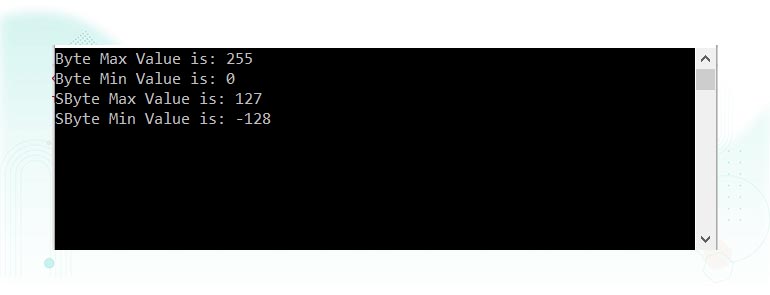
02. Short
The short data type is a signed integer that can store numbers from -32,768 to 32,767. It occupies 16-bit memory. The short keyword is an alias for Int16 struct in .NET.
The ushort data type is an unsigned integer. It can store only positive numbers from 0 to 65,535. The ushort keyword is an alias for UInt16 struct in .NET.
Example:
using System;
using System.Collections.Generic;
using System.Linq;
using System.Text;
using System.Threading.Tasks;
namespace HelloWorld
{
class Program
{
static void Main(string[] args)
{
Console.WriteLine("short(Int16) Max Value is: " + Int16.MaxValue);
Console.WriteLine("short(Int16) Min Value is: " + Int16.MinValue);
Console.WriteLine("ushort(Unt16) Max Value is: " + UInt16.MaxValue);
Console.WriteLine("ushort(Unt16) Min Value is: " + UInt16.MinValue);
Console.ReadLine();
}
}
}
Output:
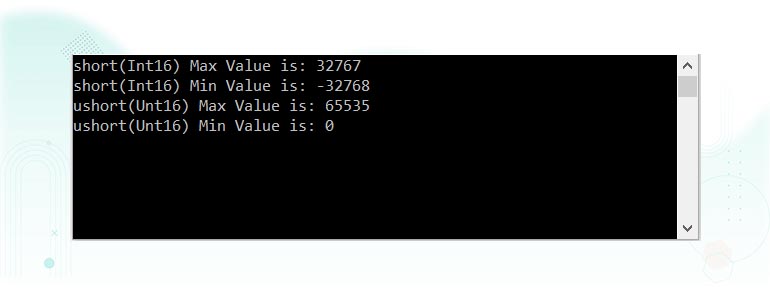
03. Int
The int data type is 32-bit signed integer. It can store numbers from -2,147,483,648 to 2,147,483,647. The int keyword is an alias of Int32 struct in .NET.
The uint is 32-bit unsigned integer. The uint keyword is an alias of UInt32 struct in .NET. It can store positive numbers from 0 to 4,294,967,295. Optionally use U or u suffix after a number to assign it to uint variable.
Example:
using System;
using System.Collections.Generic;
using System.Linq;
using System.Text;
using System.Threading.Tasks;
namespace HelloWorld
{
class Program
{
static void Main(string[] args)
{
Console.WriteLine("int(Int32) Max Value is: " + Int32.MaxValue);
Console.WriteLine("int(Int32) Min Value is: " + Int32.MinValue);
Console.WriteLine("uint(UInt32) Max Value is: " + UInt32.MaxValue);
Console.WriteLine("uint(UInt32) Min Value is: " + UInt32.MinValue);
Console.ReadLine();
}
}
}
Output:
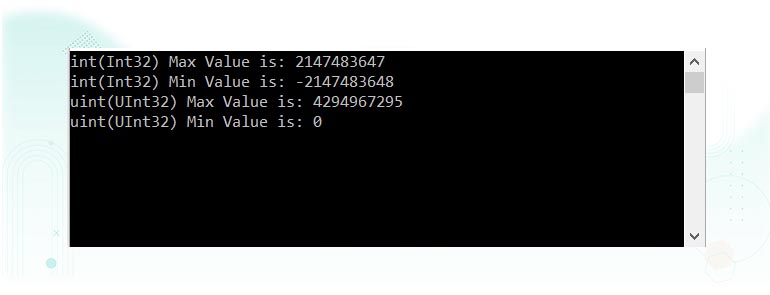
04. Long
The long type is 64-bit signed integers. It can store numbers from -9,223,372,036,854,775,808 to 9,223,372,036,854,775,807. Use l or L suffix with number to assign it to long type variable. The long keyword is an alias of Int64 struct in .NET.
The ulong type stores positive numbers from 0 to 18,446,744,073,709,551,615. If a number is suffixed by UL, Ul, uL, ul, LU, Lu, lU, or lu, its type is ulong. The ulong keyword is an alias of UInt64 struct in .NET.
Example:
using System;
using System.Collections.Generic;
using System.Linq;
using System.Text;
using System.Threading.Tasks;
namespace HelloWorld
{
class Program
{
static void Main(string[] args)
{
Console.WriteLine("long(Int64) Max Value is: " + Int64.MaxValue);
Console.WriteLine("long(Int64) Min Value is: " + Int64.MinValue);
Console.WriteLine("ulong(UInt64) Max Value is: " + UInt64.MaxValue);
Console.WriteLine("ulong(UInt64) Min Value is: " + UInt64.MinValue);
Console.ReadLine();
}
}
}
Output:
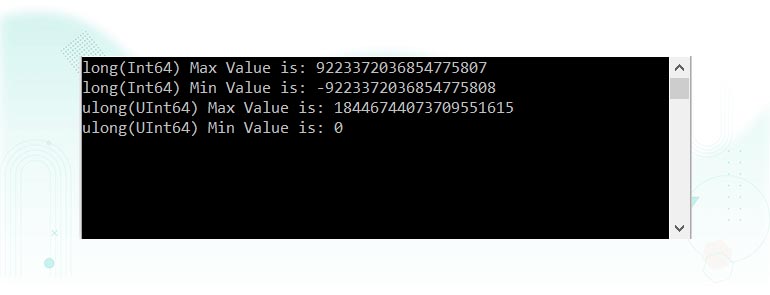
C# Min and max values
Each integer type has the MinValue and MaxValue constants that provide the minimum and maximum of the type.
To access these values, you use the dot operator (.).
For example:
int.MinValue
int.MaxValueThe following displays the range of the int type:
using System;
using System.Collections.Generic;
using System.Linq;
using System.Text;
using System.Threading.Tasks;
namespace HelloWorld
{
class Program
{
static void Main(string[] args)
{
Console.WriteLine($"int range: ({int.MinValue},{int.MaxValue})");
Console.ReadLine();
}
}
}Output:
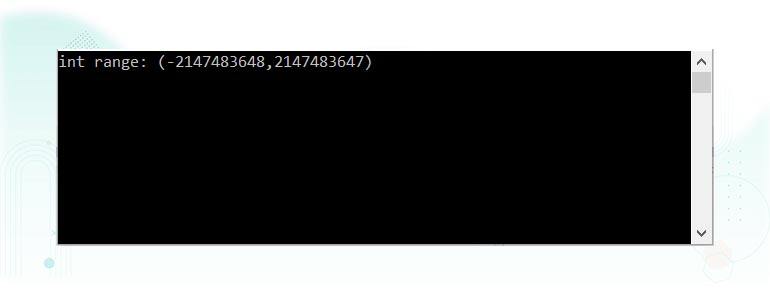
Various C# integer variable types
The following table lists the various C# integer variable types together with details of the number of bytes of physical memory consumed by each type and the acceptable value ranges:
| Type | Size in Bytes | Value Range |
|---|---|---|
byte | 1 byte | 0 to 255 |
sbyte | 1 byte | -128 to 127 |
short | 2 byte | -32,768 to 32,767 |
ushort | 2 byte | 0 to 65,535 |
int | 4 byte | -2,147,483,648 to 2,147,483,648 |
uint | 4 byte | 0 to 4,294,967,295 |
long | 8 byte | -9,223,372,036,854,775,808 to 9,223,372,036,854,775,807 |
ulong | 8 byte | 0 to 18,446,744,073,709,551,615 |
Related Tutorials:
- C# Data Types
- C# Variables
- C# Types of Variables
- C# Floating Point Variables
- C# Boolean Variable Type
- C# Character Variable Type
- C# String Variables
- C# Casting Variable Types
- C# Implicitly Typed Local Variable: C# Var keyword
- C# Keywords
- C# Comments
- C# Parameters
- C# Constants
- C# Value and Reference Types
- C# Numeric Types
- C# Numeric Value
- C# User Input